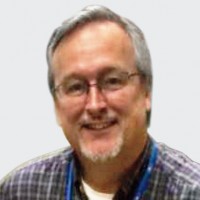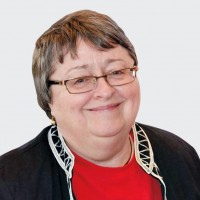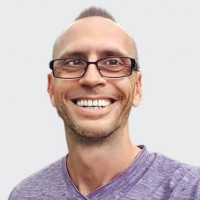Click here to read a digital edition of this article.
Introduction | A-B | C-E | F-G | H-I | J-K | L-P | R-S | T-Z | Stats
Christine Hackford
HIV Negative
Indialantic, Florida

Christine HackfordCourtesy of Christine Hackford
Christine started out as a medical case manager for people living with HIV in the South more than two decades ago. She is now the executive director at Project Response, a nonprofit AIDS service organization serving low-income HIV-positive people in the Space Coast and Treasure Coast areas of Florida, which encompass five counties. Project Response’s case management programs assist nearly 600 people living with HIV in the region, and its HIV education and testing programs reach nearly 4,000 people in the community each year. Under Christine’s management, many former clients have gone on to volunteer, serve and even work for Project Response to further empower themselves and help other HIV-positive people overcome barriers to care, testing and treatment.
Leslie Hall
HIV Negative
Capitol Heights, Maryland

Leslie HallCourtesy of Leslie Hall
Leslie serves as the manager of the HBCU Project for the Human Rights Campaign. His role involves engaging HBCUs (historically black colleges and universities) to create inclusive policies and environments for LGBT students and staff. Leslie has a vision for HBCUs to become leaders in the fight to end the epidemic. In August, he will convene health and wellness professionals from HBCUs across the country to discuss best practices for engaging LGBT students around HIV prevention strategies including Truvada as PrEP. He also manages the annual HBCU Leadership Summit, where he is partnering with Gilead to incorporate a health and wellness component centered on HIV prevention and advances in treatment. Leslie understands that you can’t talk to HBCUs and not talk about HIV.
TK “Thunder Kellie” Hampton
HIV Positive
Nashville, Tennessee

TK HamptonCourtesy of TK Hampton
Thunder Kellie wears many hats: HIV educator, photographer, playwright, advocate and fitness guru, to name just a few. Shortly after his diagnosis in 1997, Thunder penned a play titled You Shall Live that addressed issues and shared statistics related to the HIV/AIDS epidemic. Over the past 10 years, he’s given speeches at colleges across the United States and around the world on sexual behavior, HIV and healthy living. In his community, the Tennessee native is known as a loud, funny activist who eats, sleeps and breathes HIV prevention. Currently, he is working on a campaign called “LHIV” (pronounced “live”) that works to empower men and women living with HIV in the South to aspire to healthy lives.
Danny Harris
HIV Positive
Little Rock, Arkansas

Danny HarrisCourtesy of Danny Harris
You could say Danny is an advocate with a lot of drive. As the statewide outreach and prevention coordinator at ARcare HIV Special Services Program, he clocks countless miles and hours in his car covering 36 medical centers and 14 Ryan White case management offices throughout Arkansas. Danny established and conducts a series of statewide support groups called the Positive Empowerment Project (PEP) and produces and circulates the Positive Empowerment Newsletter three to four times a year to help others navigate the challenges of living with HIV. Even with a new wife and daughter, Danny finds the energy to attend health fairs, churches, colleges and LGBT events, offering HIV testing, education and condoms. He also works at homeless shelters, rehab facilities and a food pantry for people living with HIV. Folks with HIV in Arkansas know a supportive friend is only ever a phone call—or a drive—away.
David Hearn
HIV Negative
Plano, Texas

Courtesy of David HearnDavid Hearn
David has dedicated the majority of his adult life to raising funds for and awareness of HIV/AIDS. Over the years, he’s lost two partners and 34 friends to AIDS-related illness. In 1996, he founded the Greg Dollenger Memorial AIDS Fund (GDMAF) to honor his partner’s memory. Today, the Plano-based organization provides “last resort funds” to people living with HIV, covering expenses such as rent, new refrigerators for keeping medications viable, oxygen tanks, home and auto repairs, insurance copays and more—necessities that can appear unexpectedly in the lives of people living with HIV. Over the last two decades, David’s volunteer-run organization estimates that it has raised more than $1 million. In his spare time, David served on the board of directors for AIDS Arms in Dallas and also AIDS Services of McKinney, and he regularly volunteers for other HIV-related organizations in his community.
Ronald Henderson
HIV Negative
Tallahassee, Florida

Ronald HendersonCourtesy of Ronald Henderson
As the state minority AIDS coordinator for the Florida Department of Health (DOH), Ronald is tasked with bringing HIV awareness, prevention and treatment to groups disproportionately affected by the epidemic. He established the state’s first Black Leadership Conference on HIV/AIDS, helped create the Sistas Organizing to Survive (S.O.S.) project and coauthored the report “Silence Is Death: The Crisis of HIV/AIDS in Florida’s Black Communities,” which documented the epidemic in Florida and outlined new strategies. He has also served on the Florida Council on the Social Status of Black Men and Boys and on the African-American Advisory Committee and Latino Advisory Committee of the National Alliance of State and Territorial AIDS Directors (NASTAD). He has also led the Minority HIV/AIDS Task Force, which makes recommendations to the governor and legislature. Since Ronald joined the Florida DOH in 1999, HIV cases among African Americans in that state have dropped 59 percent through 2015—proof positive of his excellent work.
Jean Hernandez
HIV Negative
Birmingham, Alabama

Jean HernandezCourtesy of Jean Hernandez
The Latino population in the South has been expanding, particularly in Alabama, where Latinos make up 4 percent of the states’ residents. HIV disproportionately affects the community, so the work of Jean, the Latino outreach coordinator at AIDS Alabama, remains vital. Not only is this proud Boricua on the ground directly educating people and connecting them to care, but she’s also sharing her knowledge with groups like the Latino Commission on AIDS and the state’s health department, helping them understand some of the cultural and linguistic challenges the community faces, such as health literacy, poverty and deportation. Thanks to Jean, more Latinos can thrive in the South.
Kathie M. Hiers
HIV Negative
Birmingham, Alabama

Kathie HiersCourtesy of Kathie Hiers
For Kathie, CEO of AIDS Alabama since 2002, housing is health care, which is why it remains the organization’s top priority (testing is a close second). Kathie has been fighting AIDS in the South since the epidemic’s early days in the 1980s. She is one of the founders of the Southern AIDS Coalition, and her work was featured in the film deepsouth. She’s a former member of the President’s Advisory Council on HIV/AIDS and currently serves as cochair of the Federal AIDS Policy Partnership. Her work on the national HIV front made news earlier this year when she was one of a group of advocates who met with Hillary Clinton to discuss the then presidential candidate’s HIV/AIDS platform.
Jeremy Hobbs
HIV Positive
Columbus, Georgia

Jeremy HobbsCourtesy of Jeremy Hobbs
More residents of Columbus, Georgia, are aware of their HIV status thanks to Jeremy—he even got the current mayor to get tested publicly. Raising awareness is just one aspect of his enthusiastic leadership. He founded Chattahoochee Valley Better Way Foundation/Rise Above HIV to better educate folks about the epidemic and to help those living with HIV, and he founded and directs COLGAY Pride to advocate for LGBT equality. Jeremy has organized HIV support groups, 5K runs for AIDS causes and community events around HIV and hepatitis testing. Considering his activism and political work—he’s gearing up for a state Senate run—it’s no wonder the mayor presented him with a key to the city.
Monique Howell-Moree
HIV Positive
Holly Hill, South Carolina

Monique Howell MoreeCourtesy of Monique Howell-Moree
Monique found out she was HIV positive in 2005 when she was an administrative clerk in the U.S. Army and pregnant with her third child. Six months after her diagnosis, she found herself in the midst of an HIV-criminalization battle. Although charges against her were eventually dropped, she was discharged from the Army. Ever since, Monique has been a fierce opponent of HIV criminalization laws and an advocate for HIV/AIDS awareness. She wrote a memoir titled Living Inside My Skin of Silence. She also became the founder and CEO of Monique’s Hope for Cure Outreach Services. Monique continues to speak out across the country and is a member of the Positive Women’s Network–USA in South Carolina.
Introduction | A-B | C-E | F-G | H-I | J-K | L-P | R-S | T-Z | Stats
To read the 2015 POZ 100, click here.
To read the 2014 POZ 100, click here.
To read the 2013 POZ 100, click here.
To read the 2012 POZ 100, click here.
To read the 2011 POZ 100, click here.
To read the 2010 POZ 100, click here.






Comments
Comments